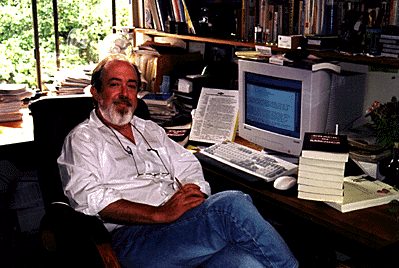![[Currents header graphic]](/homeart/currents_header.gif)
![[Currents header graphic]](/homeart/currents_header.gif)
August 18, 1997

|
|
Craig Reinarman
|
The 'War on Drugs' and the crack cocaine scare that gripped the nation from 1986 to 1992 triggered the most massive wave of imprisonment in the country's history and eroded civil rights, say the authors of a new book called Crack in America: Demon Drugs and Social Justice.
Crack in America focuses attention on how politicians and the media embraced drug war rhetoric and helped fuel a surge of spending on law enforcement and antidrug campaigns. But the drug war only obscured the impact of crack cocaine on its real victims: some poor residents of urban America, mostly African American and Latino, who turned to crack for a brief respite from the social and economic problems that underlie most drug abuse.
Written by a team of veteran drug researchers in law, medicine, and the social sciences, and edited by sociology professors Craig Reinarman of UCSC and Harry G. Levine of Queens College, City University of New York, Crack in America reveals the failings of U.S. drug policy.
"Beginning in 1986, crack cocaine was portrayed as a drug that threatened the very fabric of American life," said Reinarman, who also coauthored six chapters with Levine. "Politicians played on those fears to justify a nationwide law enforcement crackdown, but the use of crack cocaine was never widespread, and its addictive qualities were vastly exaggerated."
Among the themes presented in Crack in America are:
During the current congressional debate on the disparity in sentencing laws for possession of crack and powdered cocaine, Congressman John Conyers distributed copies of Crack in America to all the members of the Congressional Black Caucus.
Joseph McNamara, former chief of police in San Jose, and now a fellow at Stanford University's Hoover Institution, is one of the few law enforcement officials who broke ranks during the drug war to decry the hysteria. He calls Crack in America "a penetrating analysis which explodes the government-propagated myths regarding crack cocaine."
Outspoken critics of U.S. drug policy today include William F. Buckley, Hugh Downs, Milton Friedman, and Walter Cronkite. Voters in California and Arizona recently passed laws legalizing the use of medical marijuana, and there is growing opposition to law enforcement use of helicopters for marijuana surveillance and to drug testing in the workplace, said Reinarman.
"For the first time since the late 1960s, there is a real debate going on about drug policy," said Reinarman. "It's not just the liberal left--there is opposition from Republicans and Democrats, and at the grassroots level and among the very elite. Drug policy is being contested."